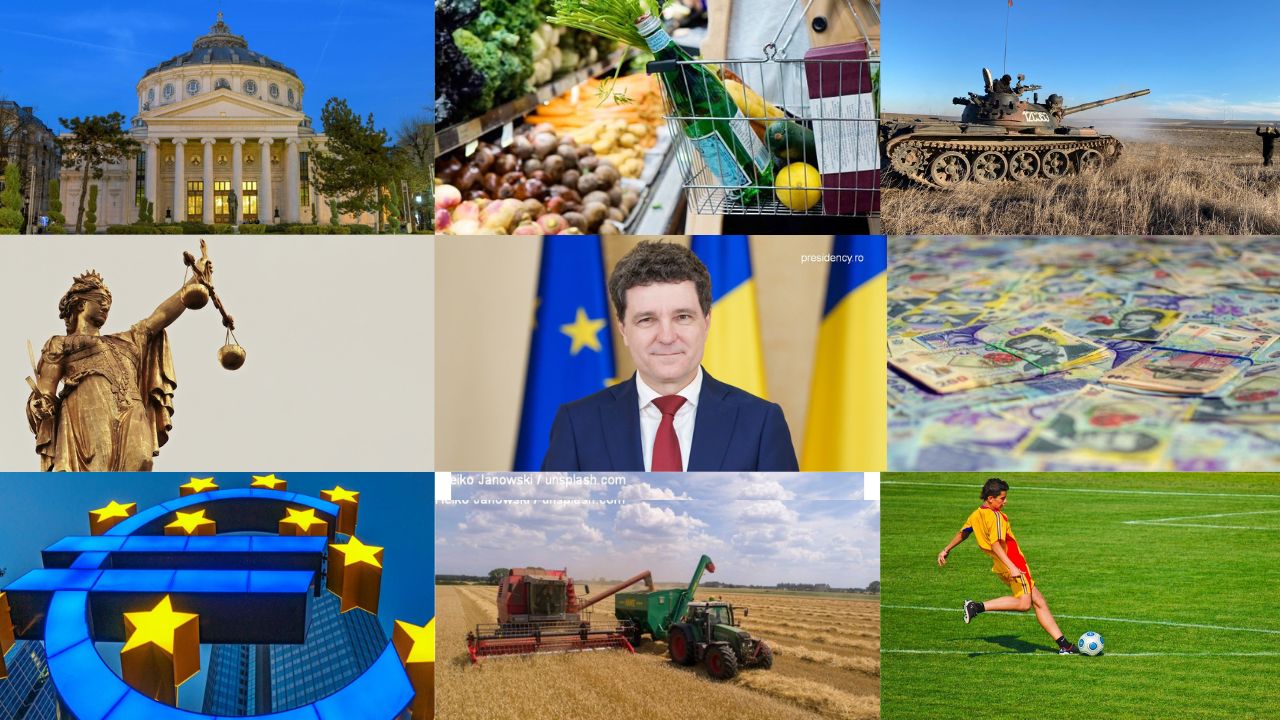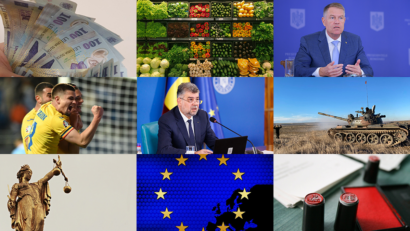THE WEEK IN REVIEW
August 25-29

Sorin Iordan, 30.08.2025, 16:24
Annual Meeting of Romanian Diplomacy
Bucharest hosted the Annual Meeting of Romanian Diplomacy this week, attended by heads of diplomatic missions, consular offices, directors of the Romanian Cultural Institute representations abroad, high-ranking state officials and special guests. Romania’s role in the current international context, foreign policy priorities, transatlantic unity, European solidarity and the role of parliamentary diplomacy were the main topics of discussion. The head of Romanian diplomacy, Oana Ţoiu, declared that the status of a member state of the European Union, membership in NATO and the Strategic Partnership with the United States of America remain the foundations of Romania’s foreign policy. She showed that the message that Bucharest sends is simple and direct: “You can rely on Romania”. For his part, the country’s president, Nicuşor Dan, said that Romania’s foreign policy must remain predictable and coherent, focused on respect for international law, the rules-based world order and dialogue and cooperation with international partners. Dan also said that there are three directions on which the Romanian state will focus: security, the economic dimension, and Romanians abroad. In his speech, the president also spoke about the opportunities offered by Romania’s geographical positioning, which can become, in his opinion, a connectivity hub between Europe, Asia and Africa, and added that the Black Sea strategy must be part of this approach.
The Republic of Moldova receives renewed European support
We cross the Prut River and arrive in the Republic of Moldova, which this week celebrated 34 years since it gained independence from the former Soviet Union. On the anniversary, French President Emmanuel Macron, German Chancellor Friedrich Merz, and Polish Prime Minister Donald Tusk arrived in Chisinau. The Moldovan state thus received a strong signal from the West in the context in which, in the midst of its European journey, it is facing pro-Russian interference and propaganda, designed to destabilize it and bring it closer to Moscow’s sphere of influence. The message we bring today is one of support, solidarity, and trust in our common future in the European Union, the three European leaders conveyed. In turn, Romanian Prime Minister Ilie Bolojan declared that Bucharest will remain an unwavering supporter of the ideals of the Republic of Moldova and of the Romanians across the Prut. The head of the government in Bucharest emphasized the unique bond of language, culture, history, and traditions between the two states and reaffirmed the firm, applied, and multidimensional support that Romania offers and will continue to offer for the accession of the Republic of Moldova to the European Union. On September 28, parliamentary elections will be held in the Republic of Moldova, which political analysts say are vital for its European path.
Second package of measures to reduce the budget deficit, in preparation
The leaders of the parties that make up the governing coalition in Romania met again this week to finalize the final details of the second package of fiscal measures to reduce the budget deficit. The spokeswoman for the executive, Ioana Dogioiu, stated that six draft normative acts are being prepared that will be part of this second package of measures. The six projects target several areas: taxation, insolvency, reform of state-owned companies, health reform, local administration, reform of special pensions for magistrates and, last but not least, the reform of the National Energy Regulatory Authority, the Financial Supervisory Authority and the National Authority for Administration and Regulation in Communications. At the same time, the executive seeks better regulation regarding the outsourcing of multinational profits, increasing the taxation of stock market gains, introducing new rules for the taxation of rental income and a 25 lei fee for parcels ordered from outside the EU. There are also changes according to which family doctors would be paid based on consultations and not on the number of registered patients, and the minimum and maximum limits for the number of children per class would be adjusted. There is also talk of a 70% increase in local taxes, the cutting of 40,000 positions in local administrations and the raising of the retirement age of magistrates to 65. According to Prime Minister Ilie Bolojan, the effects of the two packages of measures will be seen next year.
Protests against fiscal measures continue
The anticipated adoption of the second package of fiscal measures to reduce the budget deficit brought people to the streets again this week. There were protests in front of the Ministry of Education, where, for more than 20 days, teachers and schoolteachers concerned about the impact of the announced changes in the system have been gathering. They are dissatisfied with the increase in teaching standards, the merger of over 500 schools, but also the reduction of the hourly rate by over 50%. As a sign of protest, the Education unions proposed boycotting the start of the school year, scheduled to begin on September 8. Also, for the first time in a long time, unionists from several fields of activity came up with a common set of demands, including decent salaries and balancing the fiscal burden that the Government imposes to cover the deficit. Students are also dissatisfied with certain measures that affect their standard of living. Protests took place in several cities across the country, attended by employees from healthcare, railway transport, forestry, defense and public order. Magistrates are also dissatisfied, demanding changes to the retirement age and the method of calculating pensions. As a result, prosecutors from 31 prosecutors’ offices across the country have suspended their activities and are only providing emergency services.
Bucharest, once again the world center of classical music
Against this backdrop of social unrest, the 27th edition of the “George Enescu” International Festival, one of the most important classical music festivals in the world, has begun in Bucharest. For four weeks, until September 21, 2025, the Romanian capital is the world center of classical music and brings together over 4,000 artists from 28 countries, in over 100 concerts. This year, the festival marks 70 years since the passing of George Enescu and proposes, under the artistic direction of conductor Cristian Măcelaru, an edition built on three pillars: the Enescu tradition, artistic innovation and openness to new generations. The festival also comes with news, from the launch of the Enescu in Control and Enescu Immersive Experience concert series, to the return of opera and ballet to the event’s program. The festival also includes concerts, exhibitions, recitals and performances that take place in several cities in Romania, including Iași, Cluj-Napoca, Timișoara, Sibiu, Brașov, Constanța, Oradea, Arad, Târgu Mureș, Craiova and Satu Mare.




























